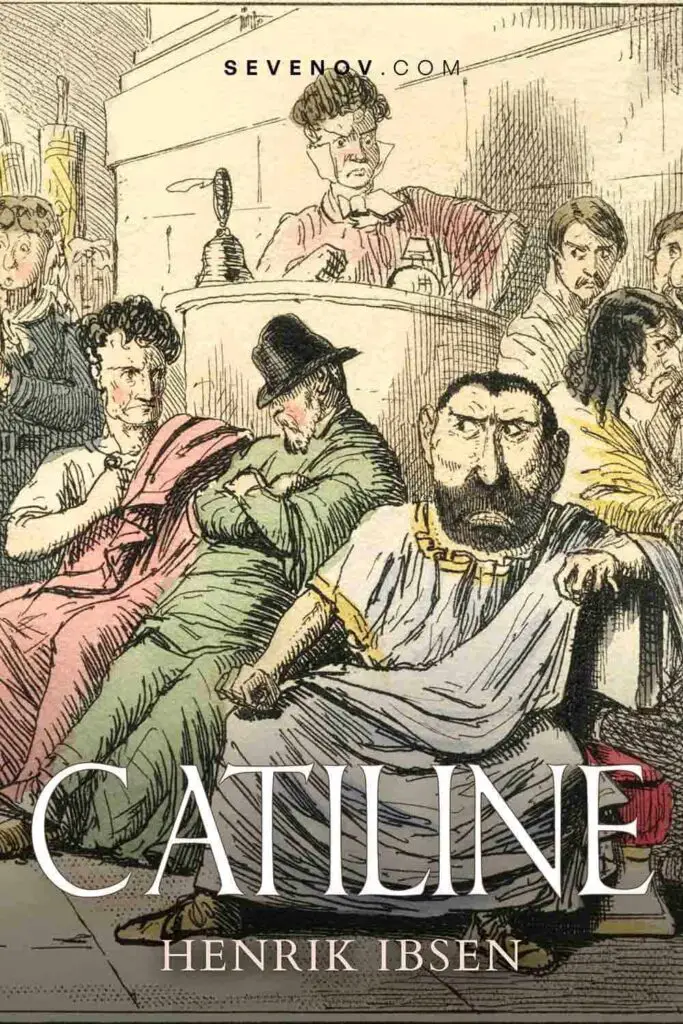
Catiline by Henrik Ibsen
Author: Henrik Ibsen
Published: 1850
Genre: Historical
Read Catiline online at PageVio
Catiline (Catilina) is the first play by Norwegian playwright Henrik Ibsen. It was published in 1850 under his pseudonym Brynjolf Bjarme and premiered in 1881 at the Nya Teatern, Stockholm, Sweden. Ibsen wrote the play in blank verse, typical of his early plays. Blank verse is a form of poetry written in unrhymed but metered lines, almost always in iambic pentameter.
At 15, Ibsen moved to the small town of Grimstad, where he worked as a pharmacist’s apprentice. There, he studied for the university entrance exams while writing poetry.
During his studies, Ibsen came across Sallust’s Catiline and Cicero’s Catilinarian orations. He soon became fascinated with Lucius Sergius Catilina, also known as Catiline (108-62 BC), a Roman senator infamous for a failed conspiracy to overthrow the Roman Republic.
The story of Catiline inspired Ibsen’s debut work, which portrays the senator in a more sympathetic light. Rather than an outright traitor, Ibsen’s Catiline is a conflicted individual in whom “idealism and licentiousness struggle for mastery.” In the preface for the second edition of the play, Ibsen wrote that “there are given few examples of historical persons, whose memory has been more entirely in the possession of their conquerors, than Catiline.”
Catiline explores the conflict between duty and desire that will dominate many of Ibsen’s later plays. The manipulative and alluring Furia is also regarded as a possible prototype for Hedda Gabler.
1. Catiline Synopsis
Catiline, a Roman noble, is torn between his wife, Aurelia, and his passionate love for a vestal virgin, Furia. At the same time, his fellow aristocrats urge him to lead a plot to overthrow the Roman Republic. Catiline is initially reluctant to spill the blood of his countrymen. However, he is eventually persuaded by Furia to seek greatness for himself by seizing the throne. Curius, a youth under Catiline’s guidance, is in love with Furia, and she promises to be his if he betrays Catiline. Curius’s treachery sets the stage for Catiline’s dramatic downfall.
2. Characters
Lucius Catiline – A Roman noble.
Aurelia – his wife
Furia – A vestal virgin
Curius – A youth related to Catiline
Manlius – An old warrior
Lentulus – A young Roman noble.
Gabinius, Statilius, Coeparius, and Cethegus – Catiline’s conspirators
Ambiorix and Ollovico – Ambassadors of the Allobroges
An Old Man
Priestesses and servants in the Temple of Vesta
Gladiators and warriors
Escort of the Allobroges
Sulla’s Ghost
| Henrik Ibsen Bibliography | |
| Dramas | Catiline | The Burial Mound | Norma, or A Politician’s Love | St. John’s Eve | Lady Inger of Ostrat | The Feast at Solhaug | Olaf Liljekrans | The Vikings at Helgeland | The Mountain Bird | Love’s Comedy | The Pretenders | Brand | Peer Gynt | The League of Youth | Emperor and Galilean | The Pillars of Society | A Doll’s House | Ghosts | An Enemy of the People | The Wild Duck | Rosmersholm | The Lady from the Sea | Hedda Gabler | The Master Builder | Little Eyolf | John Gabriel Borkman | When We Dead Awaken |




